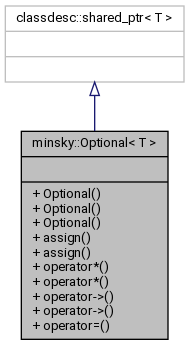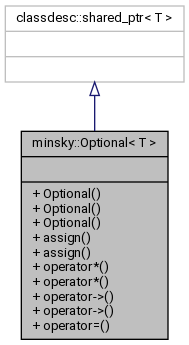minsky::Optional< T > Struct Template Reference
convenience class to omit writing XML records when data absent or empty More...
#include <optional.h>
Inheritance diagram for minsky::Optional< T >:

Collaboration diagram for minsky::Optional< T >:

Public Member Functions | |
| Optional () | |
| Optional (const T &x) | |
| template<class U > | |
| Optional (const Optional< U > &x) | |
| template<class U > | |
| classdesc::enable_if< has_empty< U >, void >::T | assign (const U &x, classdesc::dummy< 0 > d=0) |
| template<class U > | |
| classdesc::enable_if< classdesc::Not< has_empty< U > >, void >::T | assign (const U &x, classdesc::dummy< 1 > d=0) |
| T & | operator* () |
| const T & | operator* () const |
| T * | operator-> () |
| const T * | operator-> () const |
| template<class U > | |
| Optional & | operator= (const U &x) |
Detailed Description
template<class T>
struct minsky::Optional< T >
convenience class to omit writing XML records when data absent or empty
Definition at line 39 of file optional.h.
Constructor & Destructor Documentation
◆ Optional() [1/3]
template<class T>
|
inline |
Definition at line 41 of file optional.h.
◆ Optional() [2/3]
template<class T>
|
inline |
Definition at line 42 of file optional.h.
classdesc::enable_if< has_empty< U >, void >::T assign(const U &x, classdesc::dummy< 0 > d=0)
Definition: optional.h:47
◆ Optional() [3/3]
template<class T>
template<class U >
|
inline |
Definition at line 44 of file optional.h.
Member Function Documentation
◆ assign() [1/2]
template<class T>
template<class U >
|
inline |
Definition at line 47 of file optional.h.
Referenced by minsky::Optional< minsky::ShowSlice >::operator=(), and minsky::Optional< minsky::ShowSlice >::Optional().
Here is the caller graph for this function:

◆ assign() [2/2]
template<class T>
template<class U >
|
inline |
Definition at line 52 of file optional.h.
◆ operator*() [1/2]
template<class T>
|
inline |
Definition at line 55 of file optional.h.
◆ operator*() [2/2]
template<class T>
|
inline |
Definition at line 56 of file optional.h.
◆ operator->() [1/2]
template<class T>
|
inline |
Definition at line 57 of file optional.h.
◆ operator->() [2/2]
template<class T>
|
inline |
Definition at line 58 of file optional.h.
◆ operator=()
template<class T>
template<class U >
|
inline |
Definition at line 60 of file optional.h.
classdesc::enable_if< has_empty< U >, void >::T assign(const U &x, classdesc::dummy< 0 > d=0)
Definition: optional.h:47
The documentation for this struct was generated from the following file:
- schema/optional.h
